中式英语之鉴pdf
- 格式:pdf
- 大小:2.85 MB
- 文档页数:24
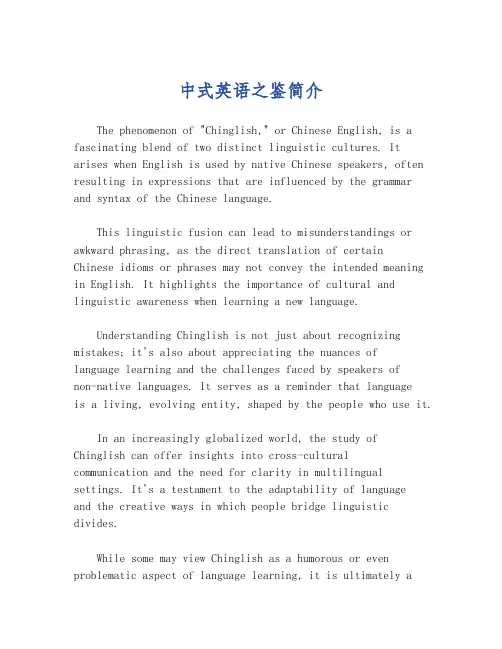
中式英语之鉴简介The phenomenon of "Chinglish," or Chinese English, is a fascinating blend of two distinct linguistic cultures. It arises when English is used by native Chinese speakers, often resulting in expressions that are influenced by the grammar and syntax of the Chinese language.This linguistic fusion can lead to misunderstandings or awkward phrasing, as the direct translation of certainChinese idioms or phrases may not convey the intended meaning in English. It highlights the importance of cultural and linguistic awareness when learning a new language.Understanding Chinglish is not just about recognizing mistakes; it's also about appreciating the nuances oflanguage learning and the challenges faced by speakers ofnon-native languages. It serves as a reminder that languageis a living, evolving entity, shaped by the people who use it.In an increasingly globalized world, the study ofChinglish can offer insights into cross-cultural communication and the need for clarity in multilingual settings. It's a testament to the adaptability of languageand the creative ways in which people bridge linguistic divides.While some may view Chinglish as a humorous or even problematic aspect of language learning, it is ultimately areflection of the rich diversity that exists within the global English-speaking community. Embracing this diversity can lead to a deeper understanding and appreciation of the world's many languages and cultures.。
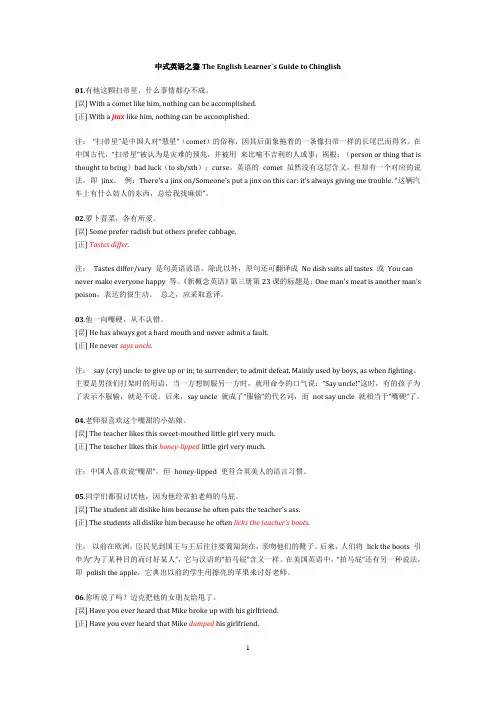
中式英语之鉴The English Learner`s Guide to Chinglish01.有他这颗扫帚星,什么事情都办不成。
[误] With a comet like him, nothing can be accomplished.[正] With a jinx like him, nothing can be accomplished.注:“扫帚星”是中国人对“慧星”(comet)的俗称,因其后面象拖着的一条像扫帚一样的长尾巴而得名。
在中国古代,“扫帚星”被认为是灾难的预兆,并被用来比喻不吉利的人或事;祸根:(person or thing that is thought to bring)bad luck(to sb/sth);curse。
英语的comet 虽然没有这层含义,但却有一个对应的说法,即jinx。
例:There's a jinx on/Someone's put a jinx on this car: it's always giving me trouble. “这辆汽车上有什么妨人的东西,总给我找麻烦”。
02.萝卜青菜,各有所爱。
[误] Some prefer radish but others prefer cabbage.[正]Tastes differ.注:Tastes differ/vary 是句英语谚语,除此以外,原句还可翻译成No dish suits all tastes 或You can never make everyone happy 等。
《新概念英语》第三册第23课的标题是:One man's meat is another man's poison,表达的很生动。
总之,应采取意译。
03.他一向嘴硬,从不认错。
[误] He has always got a hard mouth and never admit a fault.[正] He never says uncle.注:say (cry) uncle: to give up or in; to surrender; to admit defeat. Mainly used by boys, as when fighting。
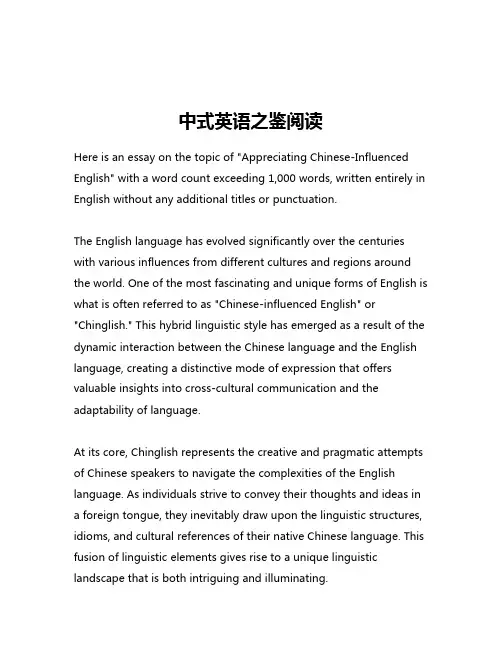
中式英语之鉴阅读Here is an essay on the topic of "Appreciating Chinese-Influenced English" with a word count exceeding 1,000 words, written entirely in English without any additional titles or punctuation.The English language has evolved significantly over the centuries with various influences from different cultures and regions around the world. One of the most fascinating and unique forms of English is what is often referred to as "Chinese-influenced English" or "Chinglish." This hybrid linguistic style has emerged as a result of the dynamic interaction between the Chinese language and the English language, creating a distinctive mode of expression that offers valuable insights into cross-cultural communication and the adaptability of language.At its core, Chinglish represents the creative and pragmatic attempts of Chinese speakers to navigate the complexities of the English language. As individuals strive to convey their thoughts and ideas in a foreign tongue, they inevitably draw upon the linguistic structures, idioms, and cultural references of their native Chinese language. This fusion of linguistic elements gives rise to a unique linguistic landscape that is both intriguing and illuminating.One of the most prominent features of Chinglish is the direct translation of Chinese idioms and expressions into English. This process, known as "literal translation," often results in phrases that may seem nonsensical or humorous to native English speakers, but which carry profound meaning and cultural significance in the Chinese context. For instance, the Chinglish phrase "the old man under the tree" might be a direct translation of the Chinese idiom "树下老人," which refers to a wise and experienced individual who imparts valuable knowledge and guidance. Similarly, the expression "to add oil" in Chinglish is a literal translation of the Chinese phrase "加油," which is used to encourage and motivate others. These linguistic quirks not only highlight the differences between the two languages but also offer a glimpse into the unique worldviews and cultural perspectives of Chinese speakers.Moreover, Chinglish often reflects the influence of Chinese grammatical structures on the usage of English. Chinese is a language that is characterized by its conciseness and the omission of certain grammatical elements, such as articles and pronouns. When Chinese speakers translate these linguistic features directly into English, the result can be sentences that appear incomplete or unconventional to native English speakers. For example, the Chinglish phrase "I go to school" might be a direct translation of the Chinese sentence "我去上学," where the pronoun "I" and the article"the" are omitted. While this construction may seem unnatural in standard English, it reflects the underlying logic and linguistic patterns of the Chinese language.Interestingly, Chinglish also showcases the creative and adaptive nature of language. As Chinese speakers grapple with the challenges of expressing themselves in English, they often develop novel ways of using words and phrases that defy the conventional norms of the language. This linguistic creativity can be seen in the coining of new terms, the repurposing of existing words, and the blending of Chinese and English elements. For instance, the term "self-service" in Chinglish might be used to refer to a situation where an individual is expected to take care of their own needs, rather than relying on the assistance of others. This innovative usage of the term "self-service" reflects the practical and resourceful mindset of Chinese speakers as they navigate the linguistic landscape of English.Furthermore, Chinglish can be seen as a testament to the resilience and adaptability of the English language. As it encounters and assimilates influences from diverse cultural and linguistic backgrounds, English demonstrates its remarkable capacity to evolve and accommodate new forms of expression. The emergence of Chinglish not only enriches the global tapestry of English but also highlights the language's ability to serve as a medium for cross-cultural exchange and understanding.In the realm of business and international communication, Chinglish can play a crucial role in bridging cultural divides and facilitating effective dialogue. As Chinese companies and individuals engage with the global marketplace, their use of Chinglish can provide valuable insights into their thought processes, cultural references, and communication styles. By understanding and appreciating the nuances of Chinglish, native English speakers can cultivate a deeper appreciation for the cultural context and perspectives of their Chinese counterparts, ultimately leading to more productive and meaningful exchanges.Moreover, the study of Chinglish can offer valuable lessons in language learning and intercultural communication. By examining the patterns and mechanisms underlying Chinglish, linguists and educators can gain valuable insights into the challenges and strategies employed by language learners. This knowledge can inform the development of more effective language teaching methodologies and materials, helping to bridge the gap between the Chinese and English languages and fostering greater cross-cultural understanding.In conclusion, the phenomenon of Chinglish is a fascinating and multifaceted aspect of the English language. It represents the creative and adaptive efforts of Chinese speakers to navigate thelinguistic landscape of English, while also reflecting the rich cultural heritage and unique perspectives of the Chinese language. By appreciating and studying Chinglish, we can gain a deeper understanding of the dynamic interplay between language and culture, and the remarkable resilience and adaptability of the English language as it continues to evolve and embrace diverse influences from around the world.。
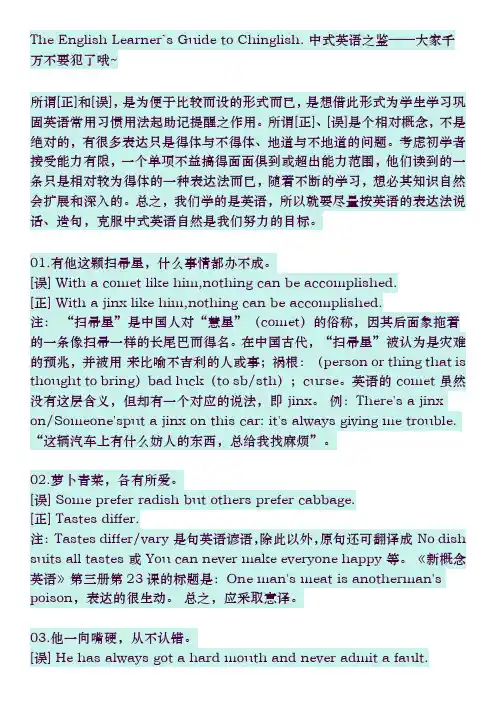
The English Learner`s Guide to Chinglish. 中式英语之鉴——大家千万不要犯了哦~所谓[正]和[误],是为便于比较而设的形式而已,是想借此形式为学生学习巩固英语常用习惯用法起助记提醒之作用。
所谓[正]、[误]是个相对概念,不是绝对的,有很多表达只是得体与不得体、地道与不地道的问题。
考虑初学者接受能力有限,一个单项不益搞得面面俱到或超出能力范围,他们读到的一条只是相对较为得体的一种表达法而已,随着不断的学习,想必其知识自然会扩展和深入的。
总之,我们学的是英语,所以就要尽量按英语的表达法说话、造句,克服中式英语自然是我们努力的目标。
01.有他这颗扫帚星,什么事情都办不成。
[误] With a comet like him,nothing can be accomplished.[正] With a jinx like him,nothing can be accomplished.注:“扫帚星”是中国人对“慧星”(comet)的俗称,因其后面象拖着的一条像扫帚一样的长尾巴而得名。
在中国古代,“扫帚星”被认为是灾难的预兆,并被用来比喻不吉利的人或事;祸根:(person or thing that is thought to bring)bad luck(to sb/sth);curse。
英语的 comet 虽然没有这层含义,但却有一个对应的说法,即 jinx。
例:There's a jinxon/Someone'sput a jinx on this car: it's always giving me trouble. “这辆汽车上有什么妨人的东西,总给我找麻烦”。
02.萝卜青菜,各有所爱。
[误] Some prefer radish but others prefer cabbage.[正] Tastes differ.注: Tastes differ/vary 是句英语谚语,除此以外,原句还可翻译成 No dish suits all tastes 或 You can never make everyone happy 等。
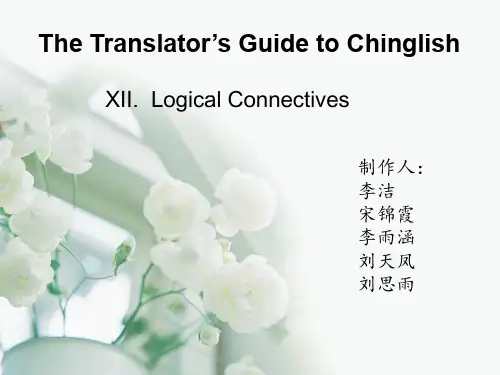
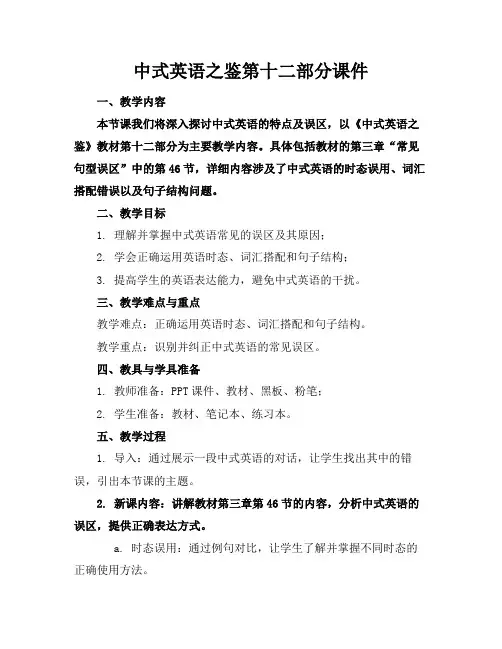
中式英语之鉴第十二部分课件一、教学内容本节课我们将深入探讨中式英语的特点及误区,以《中式英语之鉴》教材第十二部分为主要教学内容。
具体包括教材的第三章“常见句型误区”中的第46节,详细内容涉及了中式英语的时态误用、词汇搭配错误以及句子结构问题。
二、教学目标1. 理解并掌握中式英语常见的误区及其原因;2. 学会正确运用英语时态、词汇搭配和句子结构;3. 提高学生的英语表达能力,避免中式英语的干扰。
三、教学难点与重点教学难点:正确运用英语时态、词汇搭配和句子结构。
教学重点:识别并纠正中式英语的常见误区。
四、教具与学具准备1. 教师准备:PPT课件、教材、黑板、粉笔;2. 学生准备:教材、笔记本、练习本。
五、教学过程1. 导入:通过展示一段中式英语的对话,让学生找出其中的错误,引出本节课的主题。
2. 新课内容:讲解教材第三章第46节的内容,分析中式英语的误区,提供正确表达方式。
a. 时态误用:通过例句对比,让学生了解并掌握不同时态的正确使用方法。
b. 词汇搭配错误:分析常见的词汇搭配错误,引导学生学会正确搭配。
c. 句子结构问题:讲解英语的基本句型结构,让学生学会构建正确的句子。
3. 随堂练习:针对每个知识点设计练习题,让学生及时巩固所学内容。
4. 小组讨论:分组讨论生活中遇到的中式英语现象,分享经验和感悟。
六、板书设计1. 中式英语之鉴(第十二部分)2. 内容:a. 时态误用:例句对比、正确用法b. 词汇搭配错误:常见错误、正确搭配c. 句子结构问题:基本句型结构、正确表达七、作业设计1. 作业题目:a. 根据所给句子,改正其中的时态错误;b. 选择正确的词汇搭配填空;c. 仿照例句,用正确的句子结构表达相同的意思。
2. 答案:见附件。
八、课后反思及拓展延伸2. 拓展延伸:鼓励学生在课后收集生活中的中式英语例子,进行分析和改正,提高英语水平。
同时,推荐阅读相关书籍,深入了解中式英语的成因及避免方法。
重点和难点解析:1. 教学难点与重点的识别;2. 教学过程中的实践情景引入、例题讲解和随堂练习;3. 作业设计中的题目和答案的详细性与实用性;4. 课后反思及拓展延伸的深度与广度。
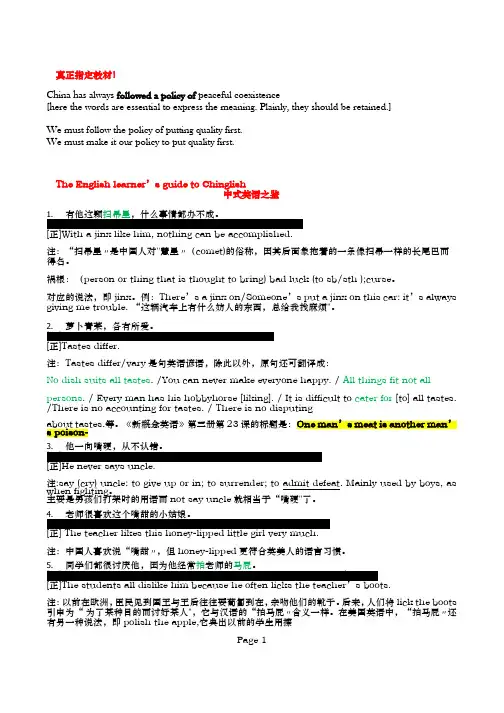
真正指定教材!China has always followed a policy of peaceful coexistence[here the words are essential to express the meaning. Plainly, they should be retained.]We must follow the policy of putting quality first.We must make it our policy to put quality first.The English learner’s guide to Chinglish中式英语之鉴1.有他这颗扫帚星,什么事情都办不成。
[误]With a comet like him, nothing can be accomplished.[正]With a jinx like him, nothing can be accomplished.注:“扫帚星〃是中国人对''慧星〃(comet)的俗称,因其后面象拖着的一条像扫帚一样的长尾巴而得名。
祸根:(person or thing that is thought to bring) bad luck (to sb/sth );curse。
对应的说法,即 jinx。
例:There’s a jinx on/Someone’s put a jinx on this car: it’s always giving me trouble. “这辆汽车上有什么妨人的东西,总给我找麻烦"。
2.萝卜青菜,各有所爱。
[误] Some prefer radish but others prefer cabbage.[正]Tastes differ.注:Tastes differ/vary是句英语谚语,除此以外,原句还可翻译成:No dish suits all tastes. /You can never make everyone happy. / All things fit not all persons. / Every man has his hobbyhorse [liking]. / It is difficult to cater for [to] all tastes. /There is no accounting for tastes. / There is no disputingabout tastes.等。
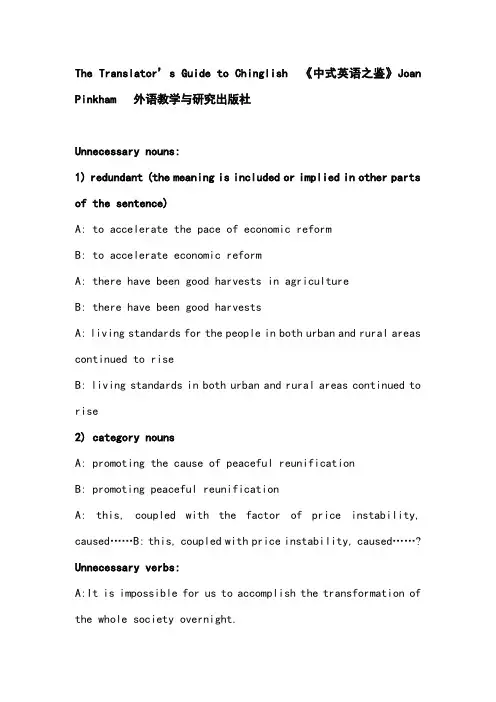
The Translator’s Guide to Chinglish 《中式英语之鉴》Joan Pinkham 外语教学与研究出版社Unnecessary nouns:1) redundant (the meaning is included or implied in other parts of the sentence)A: to accelerate the pace of economic reformB: to accelerate economic reformA: there have been good harvests in agricultureB: there have been good harvestsA: living standards for the people in both urban and rural areas continued to riseB: living standards in both urban and rural areas continued to rise2) category nounsA: promoting the cause of peaceful reunificationB: promoting peaceful reunificationA: this, coupled with the factor of price instability, caused……B: this, coupled with price instability, caused……? Unnecessary verbs:A:It is impossible for us to accomplish the transformation of the whole society overnight.B: It is impossible for us to transform the whole society overnight.A: they should conduct a careful examination of ….B: they should carefully examine…..A: until China realizes industrial modernizationB: until China modernizes its industry?More unnecessary verbs:To give guidance to = to guideTo provide assistance to = to assistTo carry out the struggle against = to struggle againstTo conduct reform = to reformTo engage in free discussion of = to discuss freelyTo place stress on = to stressTo exercise control over = to control?Unnecessary verb phrasesA: it is especially necessary to make great efforts to assimilate the achievements of other culturesB: it is especially necessary to assimilate the achievements of other culturesA: all enterprises must pay attention to promoting excellent workersB: all enterprises must see to it that excellent workers arepromoted?Unnecessary modifiersA: that theory too is a valuable ideological treasure of the PartyB: that theory too is an ideological treasure of the Party A: Singapore will bar America’s popular female pop star Madonna from staging a show in its territoryB: Singapore will bar America’s pop star Madonna from staging a show in its territoryA: now the government is working hard to improve taxation B: the government is working hard to improve taxationA: previously we used to overemphasize the need for class struggleB: we used to overemphasize the need for class struggleA: hundreds of transnational firms have started various businesses in ChinaB: hundreds of transnational firms have started businesses in ChinaA: imports of foreign automobiles have declined sharply this yearB: imports of automobiles have declined sharply this year。
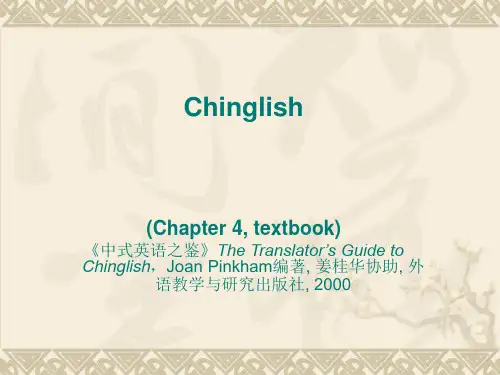
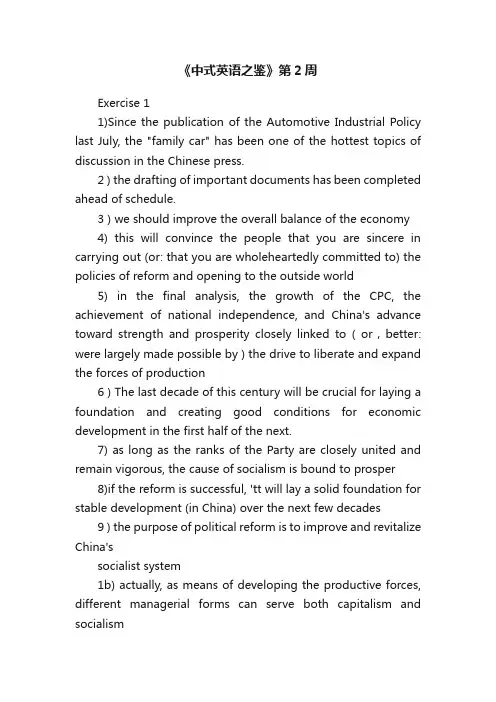
《中式英语之鉴》第2周Exercise 11)Since the publication of the Automotive Industrial Policy last July, the "family car" has been one of the hottest topics of discussion in the Chinese press.2 ) the drafting of important documents has been completed ahead of schedule.3 ) we should improve the overall balance of the economy4) this will convince the people that you are sincere in carrying out (or: that you are wholeheartedly committed to) the policies of reform and opening to the outside world5) in the final analysis, the growth of the CPC, the achievement of national independence, and China's advance toward strength and prosperity closely linked to ( or,better: were largely made possible by ) the drive to liberate and expand the forces of production6 ) The last decade of this century will be crucial for laying a foundation and creating good conditions for economic development in the first half of the next.7) as long as the ranks of the Party are closely united and remain vigorous, the cause of socialism is bound to prosper8)if the reform is successful, 'tt will lay a solid foundation for stable development (in China) over the next few decades9 ) the purpose of political reform is to improve and revitalize China'ssocialist system1b) actually, as means of developing the productive forces, different managerial forms can serve both capitalism and socialismI1)when we have dealt with those problems, our established principles and policies will only he carried out more smoothly and perseveringly12 ) What obstacles are we going to run into? As I see it, there are two or three problems that might hold up the growth of our economy.13) Mou Xinsheng, Vice-Minister of Public Security, urged public security organs to cooperate closely with banks in cracking down on white-collar crime.14) Leading comrades of Party committees and governments at all levels should often visit schools,listen to what the teachers and students have to say, and help them overcome their difficulties.15)We are not rich and cannot offer you much financial help, but we can share our experience with our friends, and that too is a kind of help.1b f It was then that Mao Zedong showed his outstanding ability to learn from bath positive and negative experience.17) So China must not allow itself to get out of control; we have the responsibility to ourselves and to all mankind.18 ) We must therefore continue to uphold Mao Zedong Thought am enrich it with new principles and new conclusions corresponding to reality.19) Of course, the report reflects my views, but in the main it embodies collective opinions.2(1y After years of study, the State Bureau of Cultural Relics has agreed to unearth the much-talked-about No. Z vault o# terra-cotta soldiers, Yuan Zhangyi, President of the Terra-cotta Museum, said recently at Lintong, where the museum is located .Exercise 21) Enterprises with exclusively foreign investment should abide by China's laws ( and regulations).2) we should try our best(or:do everything possible)to keep prices from rocketing3 ) The initiative in the war has shifted from the enemy to us.4) there will be a great many economic imbalance,which it will take a long time to remedy5 ) people who have made mistakes should be allowed to compensate by performing good deeds, provided they quickly come to realize their mistakes and make up their minds to mend their waysb) industrial enterprises should manufacture products for both military and civilian use7) We must expand and accelerate the production of import substitutes.8) although the campaign is necessary, it should not go beyond these three months9) We should expand the patriotic health campaign and improve the system of primary health Bare and the training of health workers at the grass roots.10) We veterans should take advantage of this opportunity to read and increase our knowledge; if we let it slip, we may regret it when it's too late.11)Family planning should be combined with efforts to help poor areas become prosperous.12) cadres should adopt an active attitude toward this work (Or. better: cadres should take an active interest in this world13) Promoting socialist cultural and ideological progress. (Car,better: Promoting progress in socialist culture and ideology.)14) There will be full employment.15) Our policy is firm, and we are not going to change it.1b) friendly contacts and trade relations between the Chinese a} Japanese peoples have steadily developed (or: expanded)17) To promote democracy at the village level and to advance rural development, governments at different levels must implement the Organic Law of Villagers’Committees, ensuring that villagers manage their own affairs.18) This does toot mean, however, that we can concentrate (exclusively) on industrial development to the neglect of agriculture which nowrepresents nearly 90 per cent of the economy.19) We must, in particular, put a stop to the unauthorized use of arable land and the destruction of forests,and promote the planting of trees and grass in both town and country.20 ) This year we hope to make great progress in this regard.。
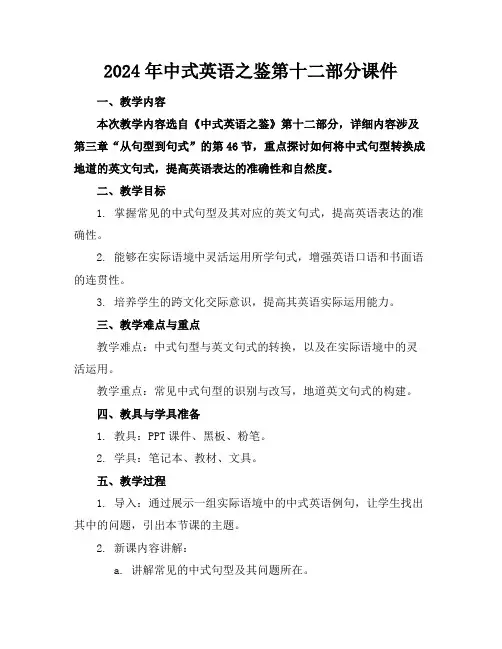
2024年中式英语之鉴第十二部分课件一、教学内容本次教学内容选自《中式英语之鉴》第十二部分,详细内容涉及第三章“从句型到句式”的第46节,重点探讨如何将中式句型转换成地道的英文句式,提高英语表达的准确性和自然度。
二、教学目标1. 掌握常见的中式句型及其对应的英文句式,提高英语表达的准确性。
2. 能够在实际语境中灵活运用所学句式,增强英语口语和书面语的连贯性。
3. 培养学生的跨文化交际意识,提高其英语实际运用能力。
三、教学难点与重点教学难点:中式句型与英文句式的转换,以及在实际语境中的灵活运用。
教学重点:常见中式句型的识别与改写,地道英文句式的构建。
四、教具与学具准备1. 教具:PPT课件、黑板、粉笔。
2. 学具:笔记本、教材、文具。
五、教学过程1. 导入:通过展示一组实际语境中的中式英语例句,让学生找出其中的问题,引出本节课的主题。
2. 新课内容讲解:a. 讲解常见的中式句型及其问题所在。
b. 对比分析中式句型与英文句式的差异,引导学生掌握转换方法。
c. 举例说明如何在实际语境中运用所学句式。
3. 例题讲解:选取具有代表性的例题,详细讲解解题思路和步骤。
4. 随堂练习:布置相关练习题,让学生巩固所学内容。
5. 小组讨论:分组讨论实际语境中的问题,培养学生团队协作和解决问题的能力。
六、板书设计1. 《中式英语之鉴》第十二部分2. 主要内容:a. 常见中式句型及其问题b. 中式句型与英文句式的转换方法c. 实际语境中的句式运用七、作业设计1. 作业题目:2. 答案:a. (答案略)b. (答案略)八、课后反思及拓展延伸1. 反思:本次课程中,学生对中式句型与英文句式的转换掌握程度如何?哪些环节需要加强?2. 拓展延伸:a. 鼓励学生阅读英文原版书籍,提高英语语感。
b. 建议学生关注日常生活中的中式英语现象,进行自我纠正和改进。
c. 组织英语角活动,让学生在真实语境中练习所学句式,提高英语实际运用能力。
D W T T D y有他这颗扫帚星,什么事情都办不成。
【误】With a co met like him,no thing canbe acco mplished.【正】With a jinx like him,no thing can be acco mplished.注:“扫帚星”是中国人对“慧星”(comet )的俗称,因其后面像拖着的一条扫帚一样的长尾巴而得名。
在中国古代,“扫帚星”被认为是灾难的预兆,并被用来比喻不吉利的人或事;“祸根”在英语中对应的说法是jinx 。
萝卜青菜,各有所爱。
【误】So me prefer radish but others pre-fer cabbage.【正】T astes differ.注:tastes differ/vary 是句英语谚语,原句还可翻译成No dish suits all tastes.或You can nev er make everyo ne happy.他一向嘴硬,从不认错。
【误】He has alw ays go t a hard mo uthand nev er admit a fault.【正】He never says uncle.注:say (cry)uncle 主要是男孩们打架时的用语,当一方想制服另一方时,就用命令的口气说:“Say uncle!”这时,有的孩子为了表示不服输,就是不说。
后来,say uncle 就成了“服输”的代名词,而not say uncle 就相当于“嘴硬”了。
同学们都很讨厌他,因为他经常拍老师的马屁。
【误】The students all dislike him be-cause he o ften pats the teacher ’s ass.【正】The students all dislike him be-cause he o ften licks the teacher ’s boo ts.注:以前在欧洲,臣民见到国王与王后往往要亲吻他们的靴子。
Unnecessary Modifiers中式英语之鉴冗余性修饰语可以分为5类:1. 冗余修饰语2. ⾃明修饰语3. 强调成分4. 限定修饰词(尤指形容词或副词)5. 陈词滥调冗余修饰语许多从中⽂翻译过去的形容词和副词,在英语中是多余的。
定义:其含义已经包含或隐含在句⼦其他成分或被修饰成分中的形容词和副词。
明显的冗余修饰语,如:advance forecast [天⽓预报本身就是提前的]female businesswoman Liu Zhihua [woman包含了female⼥性的意思]new innovations[发明包含了新的含义]mutual cooperation[合作本身就是共同的,双⽅或多⽅的]可省略:被修饰成分⾃带含义,约定俗成的表达,⼥性化/男性化的名字(⽆需强调性别)或者逻辑⾃带。
时间副词还有⼀类经常出现在中式英语中的冗余性修饰语就是表示动作发⽣时间的副词和表达时间的名词短语,如:at present, in the future, in the past,因为它们的含义已经通过动词的时态表达出来了。
A: now the government is working hard to improve taxationB: the government is working hard to improve taxation[现在进⾏时包含“现在“]A: previously we used to overemphasize the need for class struggleB: we used to overemphasize the need for class struggle[过去时包含”之前“]“Various”另⼀个中式英语中典型的冗余修饰语就是形容词“various”。
在中⽂中,“various”经常⽤来表示复数,但在英语⾥,复数已经以名词结尾-s的形式出现了,所以⽆需赘述。
The English Learner`s Guide to ChinglishThe English Learner`s Guide to Chinglish 中式英语之鉴01.有他这颗扫帚星,什么事情都办不成。
[误] With a comet like him, nothing can be accomplished. [正] With a jinx like him, nothing can be accomplished.注:“扫帚星”是中国人对“慧星”(comet)的俗称,因其后面象拖着的一条像扫帚一样的长尾巴而得名。
在中国古代,“扫帚星”被认为是灾难的预兆,并被用来比喻不吉利的人或事;祸根:(person or thing that is thought to bring)bad luck(to sb/sth);curse。
英语的comet 虽然没有这层含义,但却有一个对应的说法,即jinx。
例:There's a jinxon/Someone's put a jinx on this car: it's always givingme trouble. “这辆汽车上有什么妨人的东西,总给我找麻烦”。
02.萝卜青菜,各有所爱。
[误] Some prefer radish but others prefer cabbage.[正] Tastes differ.注:Tastes differ/vary 是句英语谚语,除此以外,原句还可翻译成:No dish suits all tastes. / You can nevermake everyone happy. / All things fit not allpersons. / Every man has his hobbyhorse[liking]. / Every man[one] to his(own) taste. / It is difficult to caterfor[to] all tastes. / It is hard to suit all tastes. / No dishsuits all tastes. / Some persons like to eat radishes, others prefer cabbages--people's tastes are various. /There is no accounting for tastes. / There is no disputing about tastes. 等。
《中式英语之鉴》第8周Exercise 71) we do not have the facilities necessary to produce alley steel.2) Unless you master essential skills, you will prove unequal to this kind of job.3) we must make them understand that the struggle in the North-east will be protracted.4) one reason is that we don't have a correct understanding of certain theories and principles, which is why we need to study more theory.5) At the same time, the U. S. government announced that it was severing its diplomatic relations with the Taiwan. authorities,terminating the U. S. -Taiwan Joint Defense Treaty," and withdrawing American troops from Taiwan.6) The principal criteria for judging the success of reform and the open policy are whether they help develop the productive forces of our socialist society, increase our country's overall strength, and raise the people's living standards.7) these different sectors of the economy will have to be transformed in different ways and at different at different speed.8) Cadres are being trained for the land reform and for the people's tribunals, and peasants' associations are being reorganized and expanded.9) "Zhang is always ready to help the farmers, who usually don't know how to plant and care far fruit trees," says Cai Lihong,a doctoral student under. Zhang's tutorship.10) To implement general policies in the transition period and to build socialism, we have to improve the health of ourpeople.11) In order to stabilize currency and prices, we had to balance national expenditures and revenues and guarantee sufficient supplies of goods.12) We shall abolish this class by utilizing, restricting, and transforming the capitalist economy.13) In the nine months since the Third Plenary Session of the Twelfth Central Committee, practice has proved that it was correct to reform prices.14) We estimate that once the money supply in the localities has been reduced, prices throughout the country will become stabilized by November 25.15) unless these problems are handled satisfactorily, our policies cannot be successfully implemented.16 ) The Asian 17evelopment Bank on Wednesday approved two loans, totaling $256 million, to finance projects to alleviate water shortages and reduce air pollution.17) "It is to our advantage to have an efficient system for developing and managing residential property," said Tan Kian Siew, executive deputy general manager of BJ Minghua Properties.18 ) He made these remarks during a talk with Sakurauchi Yoshio and other leading members of the delegation from the Japanese Association for Promotion of International Trade.19) This practice has helped ensure that no needy students will drop out because they are unable to pay their own tuition.20 ) "The authorities in charge of administering State assets should help promote the process,”said Zhang at a seminar organized by the Chinese Institute for Management of State Property.Exercise 81)The West really wants unrest in China. It wants turmoil not only in China but also in the Soviet Union and Eastern Europe.2) China is estimated to possess 69.4 billion tons of onshore ail reserves, but only 25 per cent of them have been verified.3) Right now the Korean people are confronted with difficulties, but they are holding on courageously, fighting a guerrilla war in the youth and putting up resistance in the north.4) After a successful revolution each country must build socialism according to its own conditions.5 ) No one would come here and invest without getting returns on his investment.b) "The registered capital of the holding company is$30 million, so we lave a,commitment to more investments here,”Wendin said. But he didn't elaborate on when the new joint projects .will be launched. The company reported sales averaging$50 million a year.7 ) Old China was dependent on imperialism not only in the economic sphere but also in the spheres of culture and education; it was exploited economically and polluted ideologically. That was very dangerous. It is now time to expose and eradicate the evil influence of imperialism.8)During the peak season,peasants, compete to sell their eggs, while during the off-season eggs are usually in short supply in the cities.9)Foreign trade has been developing rapidly in Fuxin. It has been continuously growing in variety and volume. Many of Fuxin’s quality products are welcome on the international market.10)During the Japanese and puppet regimes, mast of these position were held by Japanese. But after August 15,1945,the Japanese were replaced by Chinese.11)All these are problems left over from the past. They are acute now because the longstanding semi-colonial, semi-feudal economy hag undergone radial changes. Although these change bring some hardship with them, they are not bad in themselves.12)China's growth has peaked and is expected to slow down next year. Even so, China's economy wilt remain one of the fastest developing in the world.13) At present our government organs are overstaffed. Not all employees have to stay on in government offices; some of them can be transferred to enterprises.14) Yesterday two friends from the former Whampoa Military Academy talked about the March 20th Incident and the Southern Anhui Incident. I was interested in what they had to say, but i had to leave after an hour and a half because of other engagements.15) It cannot be said that every paragraph of this speech I am making today has Peen discussed by the Central Committee. Of course, some of the ideas have been discussed,but others are my own opinions.16) The problem now facing the authorities in Shanghai is to obtain adequate supplies of rice and cotton, and the key question is whether they can mobilize enough transport facilities.17 ) I spent a year in a university after I graduated from senior middle But I didn't learn very much there, because it was the time of the May 4th Movement.18)Prosperity is the common objective of all our nationalities, and we must never lose sight of it.19)Following the Wuchang Uprising of 1911,the Hubeimilitary government set forth the idea of changing the farm of government by establishing a republic of five nationalities, an idea that was also advocated by Dr.Sun Yat-sen.20 ) Summary of a speech made at a national forum of representatives of Customs personnel. It first appeared in People's Daily on October 26, 1949.。
The English Learner`s Guide to Chinglish. 中式英语之鉴——大家千万不要犯了哦~所谓[正]和[误],是为便于比较而设的形式而已,是想借此形式为学生学习巩固英语常用习惯用法起助记提醒之作用。
所谓[正]、[误]是个相对概念,不是绝对的,有很多表达只是得体与不得体、地道与不地道的问题。
考虑初学者接受能力有限,一个单项不益搞得面面俱到或超出能力范围,他们读到的一条只是相对较为得体的一种表达法而已,随着不断的学习,想必其知识自然会扩展和深入的。
总之,我们学的是英语,所以就要尽量按英语的表达法说话、造句,克服中式英语自然是我们努力的目标。
01.有他这颗扫帚星,什么事情都办不成。
[误] With a comet like him,nothing can be accomplished.[正] With a jinx like him,nothing can be accomplished.注:“扫帚星”是中国人对“慧星”(comet)的俗称,因其后面象拖着的一条像扫帚一样的长尾巴而得名。
在中国古代,“扫帚星”被认为是灾难的预兆,并被用来比喻不吉利的人或事;祸根:(person or thing that is thought to bring)bad luck(to sb/sth);curse。
英语的comet 虽然没有这层含义,但却有一个对应的说法,即jinx。
例:There's a jinx on/Someone'sput a jinx on this car: it's always giving me trouble. “这辆汽车上有什么妨人的东西,总给我找麻烦”。
02.萝卜青菜,各有所爱。
[误] Some prefer radish but others prefer cabbage.[正] Tastes differ.注:Tastes differ/vary 是句英语谚语,除此以外,原句还可翻译成No dish suits all tastes 或You can never make everyone happy 等。